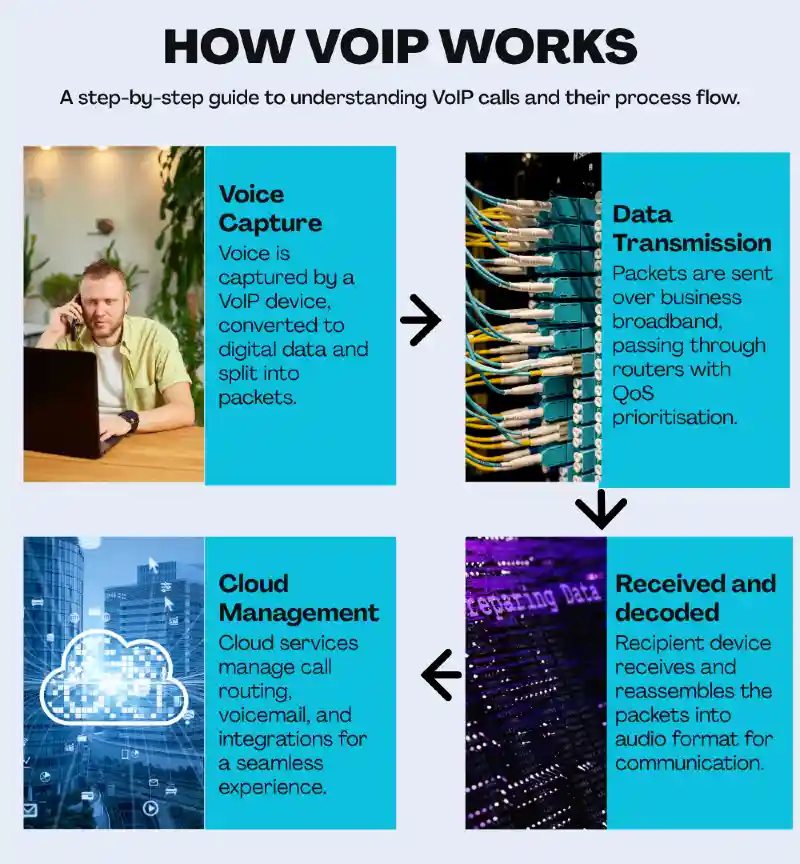How does VoIP work for businesses?
VoIP (Voice over Internet Protocol) systems enable businesses to make calls over the internet, eliminating the need for traditional business phone lines. VoIP technology converts your voice into digital signals, transmits them over your broadband connection, and reassembles them as audio on the other end, all in real time.
How VoIP works
A VoIP call might feel just like a traditional phone conversation, but behind the scenes, it’s a digital process. Each call involves multiple rapid-fire steps, from capturing your voice to routing it through the internet and delivering it to the other end. Understanding these stages helps explain why VoIP is the best choice for modern business communication.
The visual below outlines the four main stages of a VoIP call, from voice capture to cloud-based call management. It’s a simplified overview to help illustrate how business VoIP systems operate in real time.

Now let’s break down what’s happening in more detail at each stage.
1. Your voice becomes digital
When you speak into a VoIP enabled device such as a desk phone, headset, or softphone app, a microphone captures your voice and converts it into digital data.
This data is split into small packets, each containing a fragment of the conversation and routing information. These are encoded using Session Initiation Protocol (SIP), which helps initiate and manage VoIP call data efficiently.
2. Your network sends the data
Once the packets are ready, they’re sent over your business broadband connection. They pass through your business broadband router and business broadband provider infrastructure before reaching the recipient.
For optimal results, VoIP requires consistent upload and download speeds. Business setups using business full fibre broadband or business leased lines are particularly well suited. Many business routers also support Quality of Service (QoS) settings, allowing voice data to be prioritised over general internet traffic.
3. It’s received and decoded
At the other end, the recipient’s device, whether it’s another VoIP phone, a softphone app, or a mobile, receives the digital packets.
The device reassembles the data in the correct order and converts it back into audio almost instantly. The result is a seamless call experience, provided the connection on both ends supports low latency and minimal jitter.
If the recipient is using a traditional landline or a mobile device, the system passes the call through a VoIP gateway, which converts the data into a format compatible with these types of communication.
4. Cloud services manage the call
Behind every VoIP call is a cloud-based system that handles the operational side of the communication.
Hosted VoIP platforms manage routing, voicemail, auto attendants, call forwarding, and call recording remotely. These systems often connect with CRM tools or customer service software, making them ideal for modern, service-focused businesses.
Why VoIP works for modern businesses
VoIP offers businesses a flexible, internet-based phone system that can scale easily, support remote work, and reduce costs. However, selecting the right system and configuration is crucial to maximising the benefits of VoIP technology.
Our VoIP specialists have helped thousands of businesses upgrade to a better VoIP system.
Here’s our key guides and resources to help get you started:
- VoIP features: A breakdown of the most useful VoIP tools for call handling, automation, and team collaboration.
- Small business VoIP: Tailored advice for small businesses looking to switch from traditional phone lines to VoIP.
- VoIP installation checklist: A step-by-step guide to help you plan and install a business VoIP system with confidence.
- Business VoIP providers: What to look for in a VoIP provider, including options for small and growing businesses.
- Business VoIP costs: Our guide to upfront and recurring charges associated with business VoIP contracts.
- VoIP call quality: How different broadband connections affect VoIP call quality and what speeds to aim for.
- VoIP security: We explain VoIP encryption, interception risks, and how providers protect business communications.
- Business VoIP integration: How to connect VoIP systems with CRM platforms, helpdesk software, and business tools to streamline workflows.
- Remote VoIP solutions: How VoIP supports remote and hybrid teams through mobile access, device flexibility, and softphone options.

